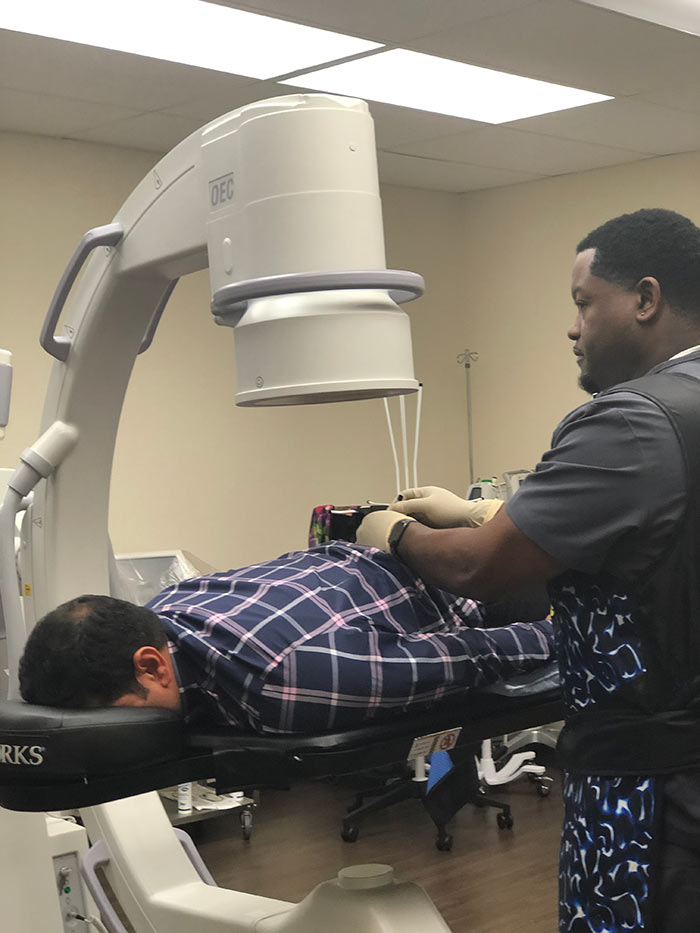 At Progressive Pain Management, we provide diagnosis and treatment for the following types of pain:
At Progressive Pain Management, we provide diagnosis and treatment for the following types of pain:
- Low Back Pain – is a disorder that involves the bones and muscles of the back. It can be due to muscle or joint strain.
- Spinal Stenosis – an abnormal narrowing of the spinal canal that can occur in any area of the spine with symptoms that may include numbness, pain and loss of motor control.
- Vertebral Compression Fractures – is defined as a vertebral bone in the spine that has decreased (collapsing) at approximately 15% – 20% in height due to fracture. It is usually caused by osteoporosis or trauma.
- Cervical And Lumbar Facet Joint Disease – is defined as cartilage in the joints either the neck (cervical) or lower back (lumbar) that has worn down.
- Sciatica/Radiculopathy (“Pinched Nerve”) – describes the symptoms of leg pain that radiate from the lower back through your hips and buttocks and down each leg which can include numbness, weakness or possible tingling.
- Sacroiliac Joint Disease – is a dysfunction in the small joint that is at the junction of the spine and pelvis.
- Failed Back Surgery Pain (FBSS) / Post-Laminectomy Neuropathic Pain – refers to chronic leg pain and/or back pain that occurs after spine surgery.
- Neuropathic (Nerve) Pain – a chronic and complex pain that results from damage to or dysfunction of the central nervous system. The damaged nerve fibers send wrong signals to other pain centers.
- Head Pain / Occipital Neuralgia (Scalp/Head Pain) – a pinched or irritated nerve along the back and top of the head that can cause a shooting, zapping, sharp, electric or tingling pains. There is one nerve on each side of the head. The pain does not cover the face or areas near the ear.
- Hip Pain – pain in the largest ball and socket joint that attaches the torso to the leg of the body that can involve pain in or around the this joint. Pain may be felt in the groin, thigh or knee areas.
- Intercostal Neuralgia (Rib Pain) – a condition that causes pain in the nerves located between your ribs. The nerves become inflamed due to trauma, coughing, sports injuries, falls and slips.
- Peripheral Neuropathy (Diabetic Nerve Pain) – is a condition where the nerves are damaged caused by chronically high blood sugar levels. Symptoms may include numbness, pain in your feet, legs or hands and loss of sensation.
- Complex Regional Pain Syndrome or CRPS (Reflex Sympathetic Dystrophy – RSD) – is a chronic condition that is characterized by severe burning pain that commonly affects the arms, legs, hands or feet. Symptoms include pathological changes in the bone and skin, tissue sweeping and extreme sensitivity to touch and excessive sweating. This condition affects the skin, nerves, blood vessels, muscles and bones at the same time.
- Herniated Discs and Degenerative Disc Disease (Discogenic Pain) – a herniated disc is an abnormal bulge or the breaking open of a spinal disc.
- Neck Pain – pain in the neck and shoulder areas that can be caused by trauma, muscle strain, abnormalities in the bone or joints, degenerative diseases or poor posture.
- Myofascial Pain – a chronic pain and inflammation in the connective tissue that covers the muscles in the body that can involve a single or a group of muscles. This pain may be developed from an injury or from excessive strain on a particular muscle or group of muscles, ligaments or tendons.
- Post Surgical Pain – pain after surgery.
- Cancer Pain (Pancreatic, Colorectal, Lung, Breast, Bone) – pain that is caused by a tumor(s) pressing on the nerves, bones or other organs in the body that can be related to your cancer treatment.
- Pain From Peripheral Vascular Disease – a condition that is caused by poor blood flow in the arteries (from the heart to the limbs) which can lead to pain in your legs, knees, thighs, hips, buttocks, shins or upper feet.
- Anginal Pain (Chest Pains) – is a pain or discomfort in the chest caused when the heart muscle does not get enough oxygen-rich blood.
- Post-herpetic Neuralgia (Shingles Pain) – a nerve pain due to the damage caused by an outbreak of shingles that is usually confined to the areas of the nerve fibers and skin which may cause a burning pain.
- Nerve Entrapment Syndromes – a condition that is caused by direct pressure on a single nerve which symptoms include numbness, pain, tingling and muscle weakness.
- Spinal Cord Injury (Central Pain) – a condition that usually starts with a sudden blow to the spine that dislocates or fractures vertebrae when displaced bone fragments, disc material or ligaments bruise or tear into spinal cord tissue.

